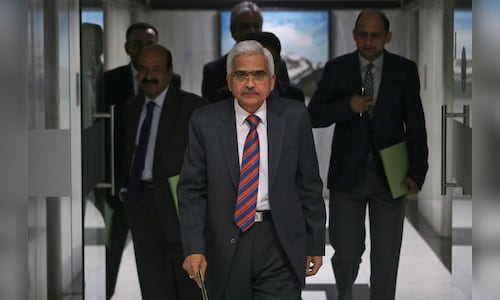Our Terms & Conditions | Our Privacy Policy
“We are not ready for full capital account convertibility,” says RBI Governor
Reserve Bank of India (RBI) Governor Shaktikanta Das, discussing the central bank’s ongoing management of exchange rate volatility, said the rupee has been “one of the least volatile currencies” globally, especially since the beginning of 2023. “The rupee has been very stable vis-a-vis the US dollar and the volatility index,” he told CNBC ‘s Tanvir Gill in an interview.
When asked why the RBI had not allowed more volatility in the rupee, the Governor remarked, “If you allow volatility, whom does it benefit? It does not benefit the economy. So why would we allow volatility?” He further clarified that while fluctuations in exchange rates are natural, excessive volatility would be damaging.
“Our stated policy is to prevent excessive volatility of the rupee,” he said, explaining that India’s strong macroeconomic fundamentals and financial stability have supported the rupee’s strength. He noted that the rupee’s stability offers “confidence to the markets, importers, exporters, and investors,” helping to avoid a situation where excessive fluctuations cause hesitation in market participation.
In recent months, the RBI has actively intervened in the foreign exchange market to manage rupee fluctuations, primarily by using public sector banks (PSUs) as proxies to sell US dollars. This intervention was particularly noticeable between June and September 2024, with the RBI reportedly selling significant amounts of US dollars to stabilise the rupee amid pressures from rising US interest rates and capital outflows.
Read more: ‘We can’t afford to look away’: RBI governor urges vigilance on inflation, global risks
Such actions help to prevent sudden depreciation that could otherwise disrupt trade and investment.
Capital Account Convertibility (CAC)
Turning to capital account convertibility (CAC), the Governor underscored that India is still not ready to liberalise the capital account fully.
“We are not ready for capital account convertibility. It is a process… One or two big things are still pending. For instance, we have not yet allowed Indian citizens to open foreign bank accounts,” Das said.
Capital account convertibility refers to converting local financial assets into foreign ones freely and vice versa without restrictions. It allows unrestricted capital movement for foreign investments, asset purchases, and remittances. While this would potentially attract foreign capital and boost liquidity, the Governor highlighted that fully opening the economy to such capital flows could expose India to volatile global markets, especially as an emerging economy.
“The risks are high in an emerging market like India, and we must proceed cautiously to avoid financial instability,” Das noted.
Nonetheless, the RBI has taken significant steps to liberalise the use of the rupee in international trade. In 2023, India signed local currency trade agreements with countries like the UAE, enabling bilateral trade to be settled in either the rupee or dirham, thereby reducing dependence on the U.S. dollar. The RBI has also promoted using rupee vostro accounts to facilitate rupee-denominated international trade.
Despite these advances, the Governor made it clear that full capital account convertibility remains a gradual process. “We have done considerable liberalisation…but certain key steps, like allowing Indian citizens to open foreign bank accounts, are still pending,” he said.
The RBI’s approach is to balance liberalisation and ensuring financial stability, especially given the global economic uncertainties.
Images are for reference only.Images and contents gathered automatic from google or 3rd party sources.All rights on the images and contents are with their legal original owners.



Comments are closed.